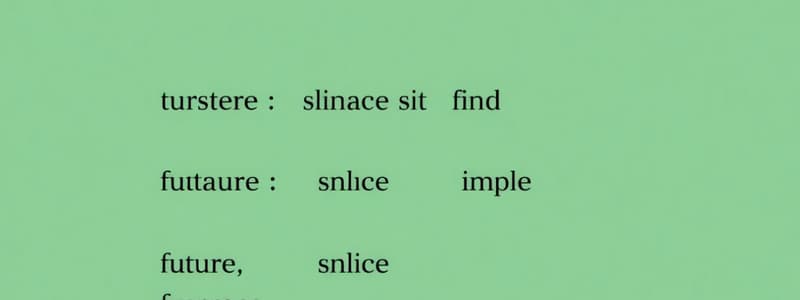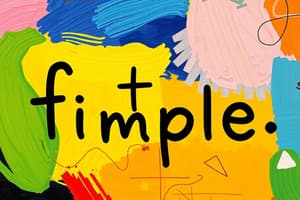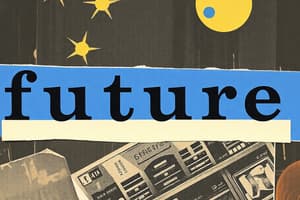Podcast
Questions and Answers
Match the following uses of the future simple tense with their corresponding examples:
Match the following uses of the future simple tense with their corresponding examples:
Making future plans and decisions = I will go to the store later. Giving instructions = You will need to complete this form. Talking about future timetables or pre-arranged events = The train will arrive at 10:00. Making predictions = It will rain tomorrow.
Match the following sentences with their correct future simple tense form:
Match the following sentences with their correct future simple tense form:
He will go to school. = Affirmative They will not eat dinner. = Negative Will you study today? = Question I will help you. = Affirmative
Match the following contractions with their full forms:
Match the following contractions with their full forms:
'll = will won't = will not 's = is 'd = would
Match the following questions with their corresponding question words:
Match the following questions with their corresponding question words:
Match the following situations with their appropriate use of the future simple tense:
Match the following situations with their appropriate use of the future simple tense:
Flashcards
Future Simple Tense
Future Simple Tense
A tense indicating actions that will occur in the future.
Forming Future Simple
Forming Future Simple
Uses 'will' followed by the base verb; negative form adds 'not'.
Creating Questions
Creating Questions
Yes/no questions start with 'will', followed by the subject.
Uses of Future Simple
Uses of Future Simple
Signup and view all the flashcards
Negative Future Simple
Negative Future Simple
Signup and view all the flashcards
Study Notes
Future Simple Tense
- The future simple tense is a common English tense, showing an action happening in the future.
- It's used for future plans and predictably future events.
- It's formed using the auxiliary verb "will" and the base verb.
- "Will" can be shortened to "ll" in informal speech.
- The negative form uses "will not," which contracts to "won't."
- Yes/no questions start with "will," followed by the subject, and the rest of the sentence.
- Questions can also begin with question words like "why," "who," "where," "when," "what," and "how."
- Common uses involve future plans, expressing willingness, giving instructions, and discussing future schedules.
- It's also used for predictions, hypothetical situations, promises, and threats.
Studying That Suits You
Use AI to generate personalized quizzes and flashcards to suit your learning preferences.




